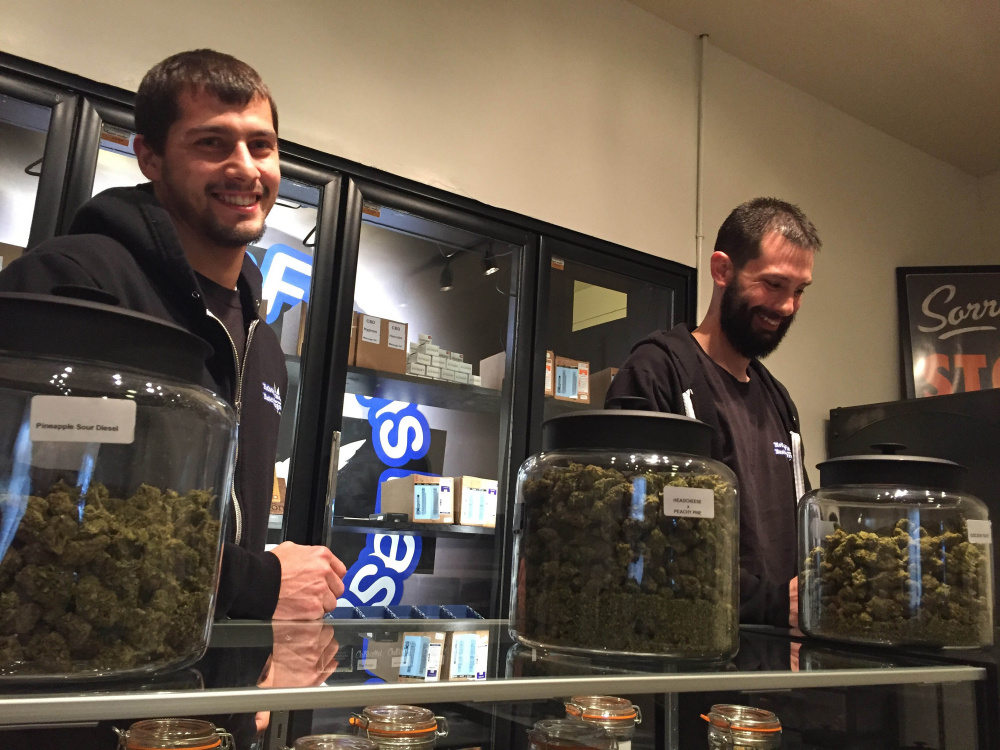HUNTINGTON, Ore. — The tiny town was dying.
Its crumbling roads were like dried, bloodless veins leading to houses and businesses starved for life. Across the main street, locomotives rumbled past on tracks where a station once gave weary steam engines rest and the city a purpose.
The modern diesel trains don’t stop in Huntington anymore. They haven’t for decades. With new, sleek bodies concealing muscular engines, they power past the town and into the folds of hills along the Oregon and Idaho border.
Jimmy McLean sometimes watched them from the weather-beaten sidewalk in front of Howell’s Cafe — its “Open” sign optimistically blazing red through the large plate glass window. Above the restaurant, dark windows are covered by battered screens.
The cement factory that employed McLean moved away, too. It’s a concrete shell — abandoned and, some say, haunted. People began leaving. Huntington’s population dropped. In 2000, it was 514. In 2005, it fell to 476. Last year, it was barely 400.
McLean, 61, took a job at Howell’s about 15 years ago — a sizable salary cut from his cement factory job. Last year, he began to think about life beyond Huntington — to the places past the hills to wherever those trains went.
And then, the marijuana shops arrived.
The cafe, with a brown Formica counter and red leather booths, began to see a few more customers trickle into its long dining area. Cars parked across the street near the rusting yellow caboose and the white gazebo bore license plates from Idaho, Utah, Wyoming and both Dakotas. The pancakes are popular — each one thicker than the plate its dished up on. He gets a lot more to-go orders as well.
“It’s not landslide business,” McLean said. “But it helps.”
When the state legalized recreational marijuana sales in 2014, cities and counties were allowed to adopt ordinances prohibiting its sale. On Oregon’s eastern side — a more conservative stretch — most of the cities and counties voted to bar pot. In total, about 90 cities and counties throughout the state went that route.
But enough people in Huntington saw pot as a chance at economic rebirth.
The city council voted 4-3 to legalize marijuana sales in 2015. Travis Young, who was the tie-breaking vote, said the town desperately needed an economic boost.
“The town was drying up,” Young said. “I wanted to keep it from blowing away.”
Within months of the vote, Steven Meland arrived, bought Candy Howland’s old convenience store and opened up Hotbox Farms Recreational Dispensary. He refurbished the waiting area, put a green neon sign in the window advertising “Free Smells” and set up a modern display area where people can choose from 52 strains of marijuana buds in large glass containers.
Meland, 26, said he wanted to help Huntington get its economy going again and employed local workers making $15 an hour. For a few months, he was the only seller in town until 420ville showed up late last year and occupied what used to be a car service station at the other end of main road.
He doesn’t mind the competition. To him, that’s just capitalism.
On a recent Saturday, both places had lines of people waiting. At 420ville, Allan Driver checked people in and gave them a numbered white tag.
Nick Brown, who had driven from Boise, Idaho, with Keshawn Carter, saw the line and decided to visit High Mountain Smoke Shop, which sells marijuana paraphernalia and other general items. It isn’t licensed to sell marijuana.
Brown, 21, bought a bong and spent about an hour inside the shop browsing and chatting with the steady stream of customers also passing the time.
When he left for 420ville, he got a number and waited outside with Carter as an electronic female voice announced over the loudspeakers, “53 please.”
“It’s like a deli or something,” Brown said.
The wait was about 30 minutes and when he went back to 420ville’s display area behind a closed door, he bought some Skywalker OG and Blue Cheese for a total of $86.40. The Skywalker was $14.40 a gram — a good price, Brown said.
Brown said he found the dispensaries on the Weed Maps app and said the hour drive was worth it because the product was reputable and was easier to get than trying to score it illegally in Boise.
When the city passed the ordinance allowing marijuana sales, it limited it to the two shops and it will also pick up a 3 percent tax on the sales — a figure that city officials hope will add up quickly as people like Brown and Carter make regular trips to Huntington. The next closest legal recreational dispensary is in Sumpter — a 90-minute drive from Huntington.
Howland, who was sitting at the local bar Friday evening having a drink with Cindy Deck — who also sits on the city council — said she hoped the tax revenue will help go toward repairing the city streets. The 62-year-old said she’d also like to have a full-time EMT and ambulance — something not currently possible
But she also vehemently opposed Huntington getting into marijuana sales. She is also worried the only real beneficiaries of the ordinance are the two dispensaries.
“They’re doing great,” she said. “But I don’t see them helping the city.”
Send questions/comments to the editors.



Success. Please wait for the page to reload. If the page does not reload within 5 seconds, please refresh the page.
Enter your email and password to access comments.
Hi, to comment on stories you must . This profile is in addition to your subscription and website login.
Already have a commenting profile? .
Invalid username/password.
Please check your email to confirm and complete your registration.
Only subscribers are eligible to post comments. Please subscribe or login first for digital access. Here’s why.
Use the form below to reset your password. When you've submitted your account email, we will send an email with a reset code.